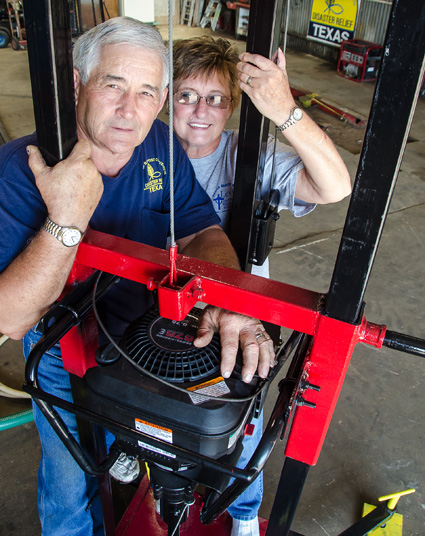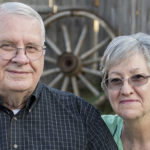SCROGGINS—When Texas Baptist Men needed a better way to drill water wells in developing countries, a couple in Northeast Texas developed a low-cost portable rig capable of drilling a 100-foot well.
A few years ago, Harold and Kathy Patterson founded Northeast Texas Disaster Response to support the disaster relief and water-drilling ministries of Texas Baptist Men. They design, build and maintain equipment for the ministries from their rural home in Scroggins, east of Winnsboro, where they attend First Baptist Church.
 When Texas Baptist Men needed a better way to drill water wells in developing countries, Harold and Kathy Patterson—founders of Northeast Texas Disaster Response—developed a low-cost portable rig capable of drilling a 100-foot well. (PHOTO/David Clanton)Drawing on more than 35 years experience as a mechanic—and on his wife’s suggestions and assistance—Patterson has created a mobile bunkhouse capable of housing nine disaster relief volunteers, a mobile shower unit and a mobile laundry unit.
When Texas Baptist Men needed a better way to drill water wells in developing countries, Harold and Kathy Patterson—founders of Northeast Texas Disaster Response—developed a low-cost portable rig capable of drilling a 100-foot well. (PHOTO/David Clanton)Drawing on more than 35 years experience as a mechanic—and on his wife’s suggestions and assistance—Patterson has created a mobile bunkhouse capable of housing nine disaster relief volunteers, a mobile shower unit and a mobile laundry unit.
Last year, he accompanied a TBM water ministry team to Kenya to drill a well. The volunteers wanted to use appropriate technology available to local residents, so they started drilling with a hand-operated auger.
“The first five feet, it worked well. But then we hit hard shale, and it wouldn’t penetrate it,” he said. With the help of local volunteers, the TBM team completed digging the well with picks and shovels.
“We have to do better than that,” he concluded.
About 40 years ago, Patterson worked on an oil well-drilling rig. Using what he learned from that experience and a lifetime of mechanical work, he and his wife created a small-scale water well-drilling rig.
Modified posthole digger
He used a similar—but costly—piece of equipment he found on the Internet as his guide. But instead of an expensive engine and complex transmission, he used a simple two-person posthole digger with a six-horsepower engine for his creation, which the Pattersons built for less than $2,000.
Sign up for our weekly edition and get all our headlines in your inbox on Thursdays
“We have needed a simple, low-cost, automated water-drilling rig for a long time as our water ministry has grown greatly in these past few years,” said Don Gibson, TBM executive director.
“The Pattersons have been able to design and build one that is ideal in function and in cost. It can be shipped anywhere, used anywhere, for drilling up to 100 feet deep.”
Because it uses a commonly available small engine produced by an international company, parts are readily available worldwide—even in many developing nations, Patterson noted.
“Even if there’s a part not available locally, they are small enough they can be shipped for next to nothing,” he said.
Headed for Nigeria and India
The first unit already has been tested at a couple of locations in Texas, and it will be used soon to drill a well for an orphanage, widows’ center and hospital in Eku, Nigeria, and a medical mission in India.
Initially, Gibson talked to the Pattersons about building five well-drilling rigs if God provided $10,000, since the project was not included in the TBM budget.
Within a few weeks, before the need was publicized widely, about $8,000 already had been donated. In fact, when the Pattersons mentioned the project at First Baptist Church in Winnsboro, four Sunday school classes gave enough to build one rig.
“I would love to see 25 of these operating,” Patterson said, noting 6,000 children a day die due to lack of clean drinking water. “If we can make a difference, it’s worth every penny and worth every minute.”
For more information about the TBM water ministry, call (214) 275-1100.
Read more about Harold and Kathy Patterson in the upcoming August issue of CommonCall magazine. CommonCall features inspiring stories about Christians living out their faith and informative articles about ministries that actually work. An annual subscription is only $24 and comes with two complementary subscriptions to the Baptist Standard. To subscribe to CommonCall, click here.
















We seek to connect God’s story and God’s people around the world. To learn more about God’s story, click here.
Send comments and feedback to Eric Black, our editor. For comments to be published, please specify “letter to the editor.” Maximum length for publication is 300 words.